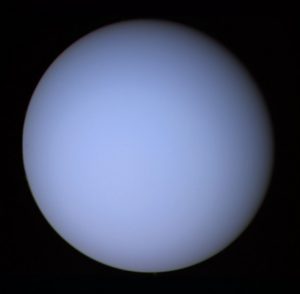In 1781 Sir William Herschel announced the discovery of a new planet that became named Uranus in the tradition of naming planets after classical mythology. The discovery of Uranus, the seventh planet from our Sun, was a pivotal moment in the history of astronomy. In antiquity, the planets referred to the seven visible points of light that moved across the fixed background of the stars. These included the Sun and the Moon, as well as the classical planets of Mercury, Venus, Mars, Jupiter, and Saturn. The discovery of Uranus marked the first time a new planet was discovered since ancient times and ushered in a new era of exploration within our solar system.
Sir William Herschel Makes a Monumental Discovery

(Credit: NASA)
Herschel was a German-born astronomer who resided in England. Born in 1738, Herschel was a polymath with a keen interest in music, mathematics, and of course astronomy. In 1757 he moved to England where he worked as an organist in Bath. He began his foray into the world of astronomy with a simple, homemade telescope and began observing the stars. He would eventually construct more than 400 telescopes during his lifetime, including a great 40-foot telescope, and most of which were superior to the ones available at the time.
On the night of March 13, 1781, Herschel was conducting a routine survey of the night sky using a 6.2-inch aperture telescope he had constructed himself. During this survey, he stumbled upon an object that appeared to be a faint, nonstellar object. Herschel initially reported it as a comet due to its slow movement across the sky and dimness but he continued to observe it over the following nights. As the months passed by Herschel and the other astronomers he reached out to for input began to suspect differently, as its orbit suggested it was a planet and no tail was visible. Eventually it became clear the object was a planet as the orbit was calculated by Pierre-Simon Laplace and Alexis Bouvard, two French mathematicians and astronomers. Their calculations confirmed that Uranus followed a nearly circular orbit around the Sun, consistent with it being a planet. For the first time in history, our solar system had expanded from the six previously known planets.
The discovery of Uranus sparked a debate over its name. Hershel, the discoverer, felt that he had the right to name the planet and he proposed the name “Georgium Sidus” or “George’s Star,” in honor of King George III. However this name was not well received in the international community, as it broke with the tradition of naming the planets after ancient Roman Gods. Several alternative names were suggested, but in the end the name Uranus was chosen and eventually accepted as the planet’s name.
The Planet Uranus and the Impact of its Discovery
Uranus is the seventh planet from the Sun and approximately 2.6 billion kilometers from Earth. It takes about 84 years for it to complete a full orbit around the Sun. Its mass is about fifteen times Earths with a diameter of about four times Earth, making it the third largest planet in our solar system. Accompanying the planet are thirteen rings and 27 named moons. Composed mostly of rock and ice, it is one of the coldest planets in the solar system with an average temperature of -216 Celsius. This is due to its low core temperature – it doesn’t generate much heat unlike Jupiter and Saturn.
The discovery of Uranus marked a new era in the exploration of our Solar System. Most significantly, it showed that our Solar System was much larger than previously thought. This provided much motivation for further exploration. Perturbations in Uranus’s orbit could not be explained by Newton’s laws of gravity if the only known planets were considered. This led to a hypothesis that there might be other unknown planets leading to the discrepancies. The discovery of Neptune in 1846 and later Pluto in 1930 confirmed this hypothesis, although Pluto was later reclassified as a dwarf planet in 2006. The discovery of Neptune was a triumph for Newton’s laws of gravity because its position was predicted based on the gravitational influence it had on Uranus.
The discovery of a planet more distant than Saturn provided motivation for advances in telescope technology as astronomers recognized the new for more powerful telescopes to study distant objects. Lastly, the naming controversy that followed highlighted the significance of tradition in the scientific community.
Continue reading more about the exciting history of science!